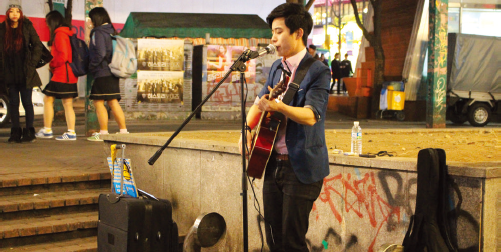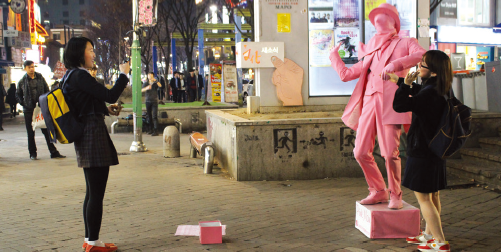
At five in the afternoon, hidden away behind the busy main streets and roads of Hongik University are the busking bands. If all goes according to plan, every night Hongik University streets are soon bustling with irregular street performances. Now that, spring has arrived, people will soon see blooming ‑ owers and hear the warm songs of birds. Like birds, a busking band blooms with its special street music. Imagine yourself on a university street and watching a busking band. Enjoy spring and listen to great music!

Busker? Busker!
The term busking was first coined around the middle 1860s in Great Britain. Up until the 20th century buskers were commonly thought to be lower class minstrels in the United States, Europe and other English speaking countries. The word Busker comes from the Spanish root word Buscar, meaning to seek, so busker literally means one seeking fame and fortune. In Korea, almost every road has become a place for buskers to perform and their music has also grown in popularity over the last two or three years. Of the celebrated busking bands, most can be found around university streets, but others sing quietly in front of ordinary office buildings. Through song, buskers give workers a sense of youth. Ko Euna, Division of Business Administration ’13 said, “I went to a high school near Hongik University, so I saw busking bands frequently as well as a variety of other street performers on the roads. Now that I am a university student, I enjoy listening to busking music at night.” Furthermore, folk music has taken off as an important genre of the busking scene. Cafés, restaurants, and bars promote busking as mainstream art form.

Jump into Special Music
Buskers have become popular because they have started to appear on popular TV shows. For example, Buskerbusker was a mere busking band three years ago. However, now, they are gaining popularity as celebrity singers in Korea. Nowadays, many TV programs feature auditions looking for rising new singers. This programming has led to a dramatic increase in underground singers dreaming of making it big by starting as a busker on the road. Also, a variety of movies or dramas now employ busking bands so people are naturally attracted to that sound. Busking or street performing is the showbiz equivalent of an entry-level job. Anybody can hit the street and put on a show. If you put on a great show you could join the ranks of famous performers. Whether you are a musician, singer, or clown as long as you entertain people, you could be the next legendary celebrity. Most importantly, you don’t have to be the greatest at what you do in order to busk. Busking is a great way for someone, a band, or a troupe to practice and experience playing in front of others. Bunrisugeo, a busking band on the street of Hyehwa said, “I had enjoyed my weekly busking band experiences. By busking, busking individuals and bands feel the strong emotion of inspiration.” Furthermore, an individual or group busking is more about practicing and performing in public places for gratuity. In many countries, the reward is generally in the form of money but other gratuities include food, drinks, and gifts. Street performance is practiced all over the world by men, women and children.

Beyond Legislation
While there is no universal code of conduct for busking, there are several common law practices that buskers must follow. That is, laws were established to protect residents from noise caused by loud and uncontrolled singing and busking. The new legislation governing buskers was made by Korea’s central government because residents living near the busking road would protest against busking often. The streets near Hongik University must now ban busking because people in the neighborhood have voiced strong dislike to Mapo-gu’s government office. It was decided that busking along the streets of Hongik University would now be illegal. But skip to government’ law, there is a call to improve music variety by music columnist Kang Minseok who said, “Music is a monologue about society and its lyrics talk to people who listen to the music."1 In other words, busking is a step forward in the development of music. Communication with the audience is the most attractive aspect for buskers because an audience’s reaction presents them with fulfillment for their endeavors. Although a busker works alone, the busker’s music brings people together.
1 Jo Donghee, “Life of a Singer-Songwriter”, Classic Column, November 11, 2011


